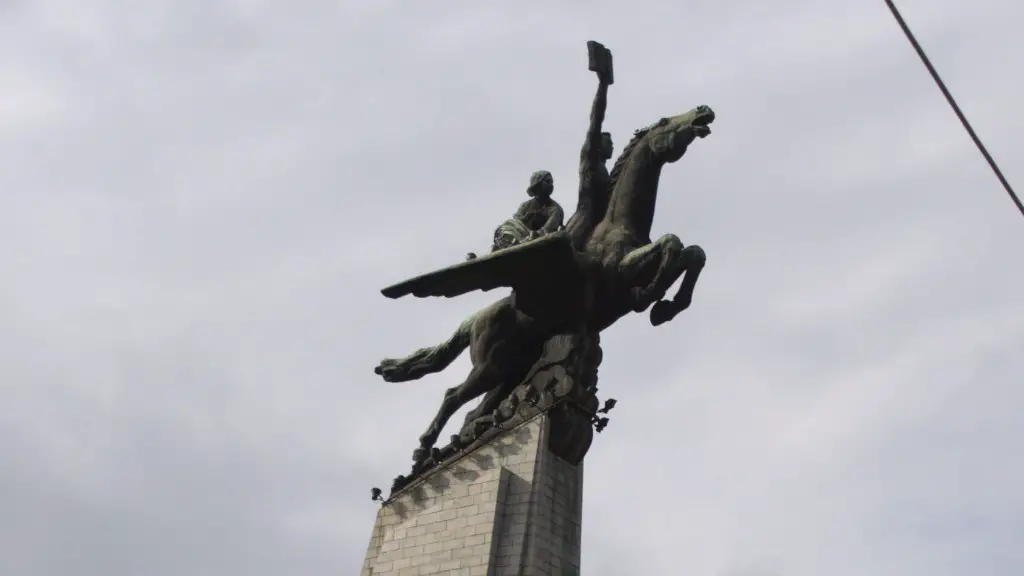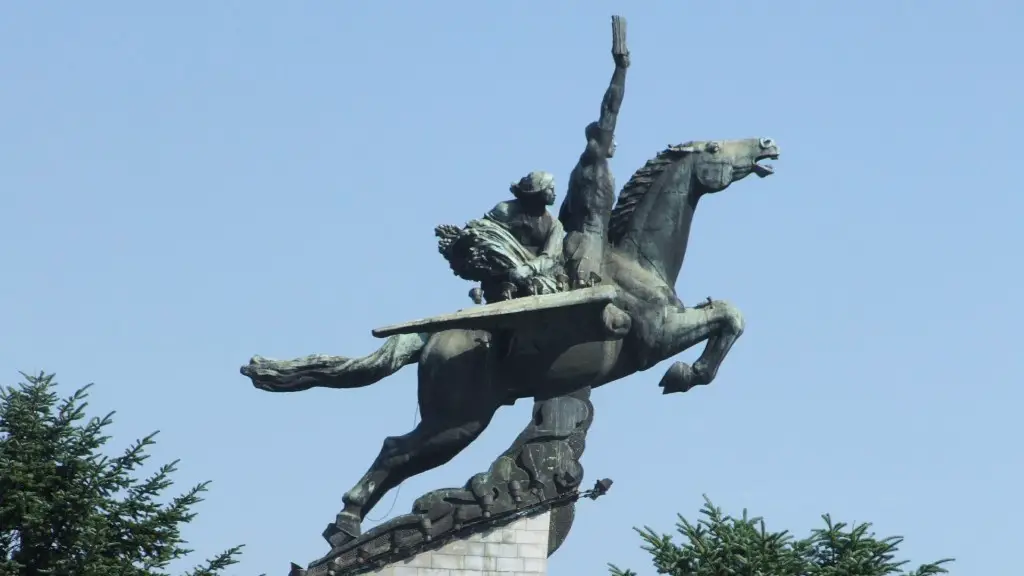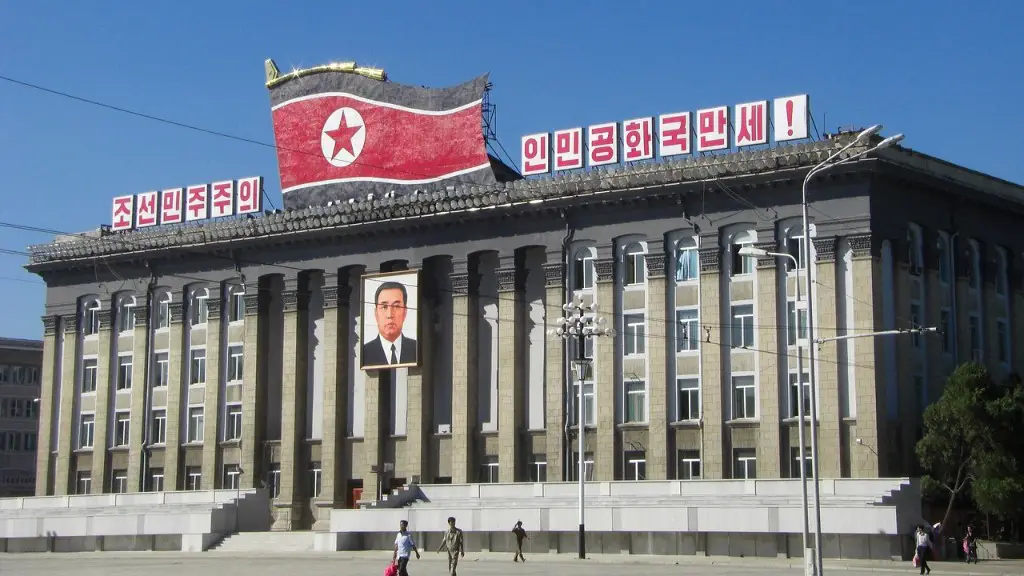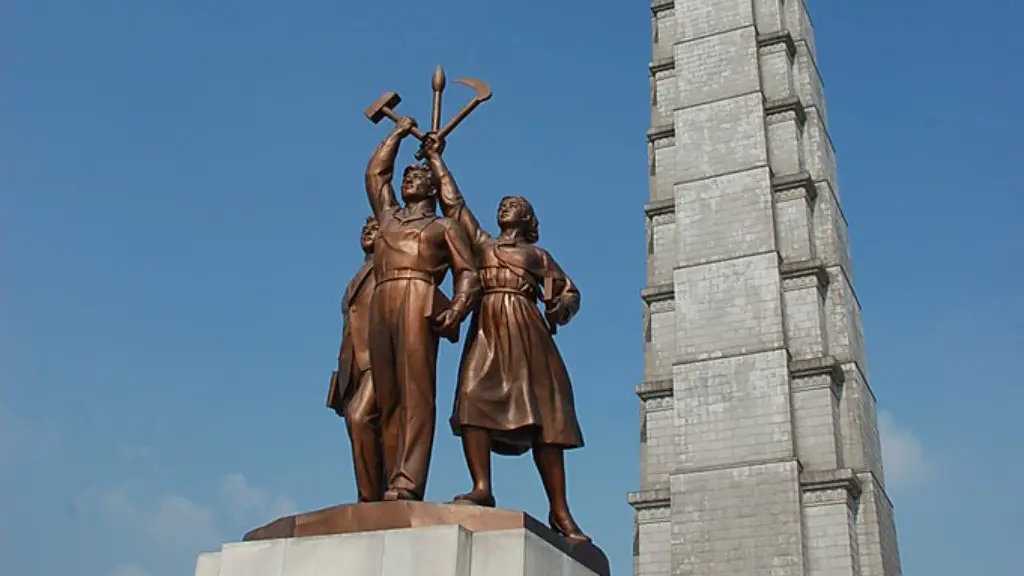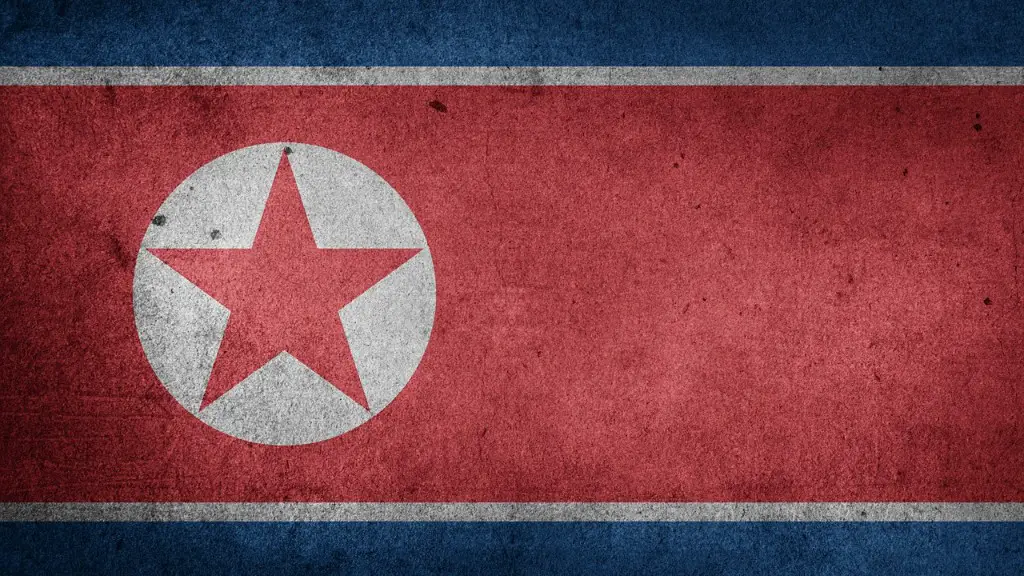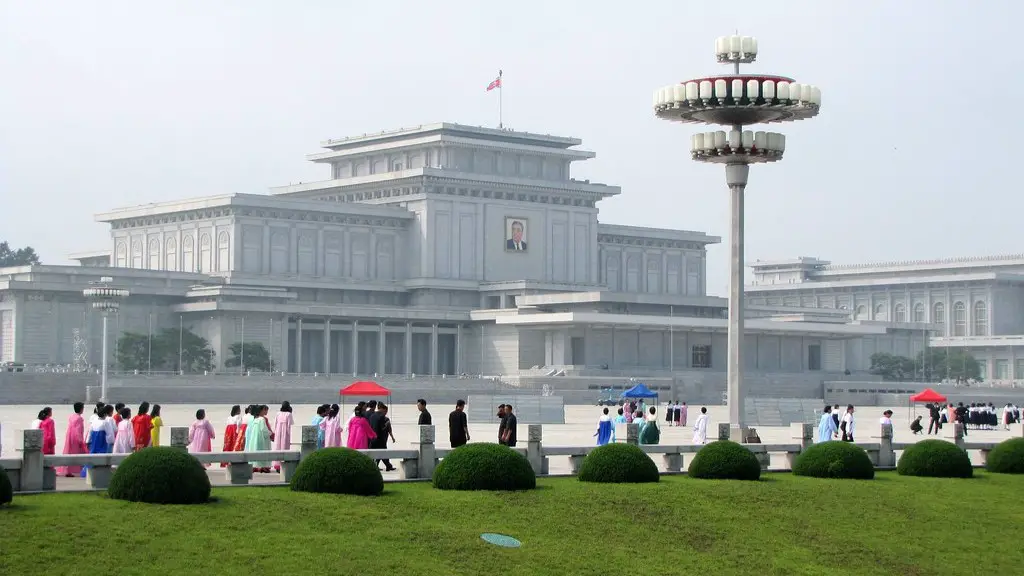When it comes to North Korea, it is difficult to understand who is truly in control. From the outside, it appears that power lies in the hands of its leader Kim Jong Un, but closer analysis reveals a complex network of powerful individuals who have an influence not only on the country, but also on the international scene. This article will explore who is in control of North Korea and analyse the extent to which these individuals shape the country’s foreign policy.
The Supreme Leader of North Korea has been Kim Jong Un since 2011. He presides over the country and its institutions, such as the powerful Korean Workers’ Party and the military. From his position of authority, Kim Jong Un has the power to make sweeping decisions as head of state, such as directing public policy, ordering military maneuvers and determining how resources are allocated. As such, he is the ultimate authority in North Korea.
Yet despite Kim Jong Un’s strong influence it would be an oversimplification to suggest that he is the sole controller of North Korea. Behind the scenes, there are other powerful individuals with a major influence on the country. This includes the elder statesmen such as Kim Yong Nam and Choe Ryong Hae, who are the primary advisers to Kim Jong Un, as well as the military leadership, which has a strong presence in the government. Moreover, there is the bureaucratic apparatus of the Korean Workers’ Party and the military, which largely administers the day-to-day running of the country and ensures that Kim Jong Un’s orders are carried out.
In short, there is no one individual who is in total control of North Korea. Kim Jong Un certainly has autonomy and vast decision-making authority but he is constrained, to some extent, by the presence of the elder statesmen and the military elite, who are able to offer insights and advice to him. Some experts even suggest that Kim Jong Un is more of a figurehead and that real political power is held by the ruling elite.
However, the intricacies of North Korea’s regime make it difficult to assess who is truly in control, so one must move beyond superficial analysis and examine the broader context. As North Korea mainly exists in a state of international isolation, it is more important to analyse the impact of the country’s foreign policy and the actions of its leaders on the global stage.
The actions of North Korea’s leaders have been universally labelled as aggressive and hostile. Kim Jong Un has ordered the testing of a variety of weapons, such as nuclear missiles and intercontinental ballistic missiles, which has caused global alarm. On the other hand, diplomatic overtures have been made by some North Korean leaders, such as Kim Jong Un’s meeting with US President Donald Trump, suggesting a desire for dialogue and relations.
In the final analysis, it is clear that no individual or group is in complete control of North Korea. Power is shared between the ruling elite and the military leadership, which both have a significant influence on the country’s actions on the international arena. Ultimately, it is the actions of Kim Jong Un and other leaders that shape the country’s foreign policy and determine its standing in the international community.
Dynamic Economy
North Korea’s dynamic economy has been a source of surprise and total puzzlement to international outsiders. The country’s own estimated combined Gross Domestic Product (GDP) growth rate was 3.9% between 2009 and 2016, in addition to estimated growth rates of 3.7% during 2018 and 2019. North Korea’s growth rate has even outpaced its northern rival, South Korea, for much of this time.
Much of the country’s growth has been attributed to the increase in resources that it exported – mainly raw materials like coal, iron ore and oil. Part of its success can be traced to its tenacious embrace of technological innovation and its trend towards modernizing both production and services.
The increasing presence of foreign investment in the country is also viewed as a driver for its economic growth. A number of major international corporations, such as the Chinese telecoms company Huawei, have established partnerships with North Korea in recent years, contributing to the modernisation of domestic production as well as technological advancement.
Although North Korea’s growth rate has slowed in the last few years, it remains arguably one of the most dynamic economies in the region. Unsurprisingly, many of the country’s leaders take pride in this accomplishment and continue to strive for further successes. It is safe to say that North Korea has largely managed to defy the odds and buck international trends.
The question remains as to who is responsible for this success. One thing is for certain: it is not solely the result of Kim Jong Un’s leadership. North Korea’s growth is the result of careful planning, the right resources, and an aligned vision between the country’s leaders and its international partners. It is part of a larger effort by the country’s rulers to evolve and emerge as a regional powerhouse.
Relationships with Neighbors
From a global perspective, North Korea’s relationships with its neighbors have fluctuated over the years. North and South Korea were officially divided in 1945 and, since then, the two countries have struggled to maintain a functional relationship. This culminated in the Korean War, which ended in 1953 and left a legacy of animosity and a reluctance to cooperate.
More recently, however, North Korea has engaged in diplomatic dialogues with nations from the region. South Korea has become a key partner in the reunification process and has held a number of high-level summits with North Korean leaders. Similarly, North Korea has sought to improve relations with China, its main ally and source of international aid. Moreover, the country has made attempts to resolve the issues with Japan and soften its stance towards US foreign policy.
Yet, despite these diplomatic overtures, North Korea remains shrouded in mystery, and its relationships with its neighbors remain fragile. It is clear that the country’s rulers are cautious and unwilling to compromise, which is a reflection of their desire to retain control. North Korea’s leaders are determined to maintain their grip on power and, as a result, they will do whatever it takes to ensure that their vision is realised.
Despite the country’s reluctance to comply with international standards, it would be foolish to suggest that North Korea’s leaders are invulnerable. In truth, they understand that they must engage in dialogue and co-operation. Ultimately, the country’s rulers are aware that, in order to survive and thrive, they must build strong and stable relationships with their neighbours.
Nuclear Program
The development of nuclear weapons has been a major priority for North Korean leaders since the early 1980s, when Kim Il-Sung began the country’s nuclear program. Since then, the leaders have been determined to expand the program and have devoted considerable resources to it. This success has largely been attributed to the acquisition of nuclear weapons technology from other nations, as well as North Korea’s own technical prowess.
In 2006, North Korea conducted its first nuclear test, thus confirming its status as an emerging nuclear state. Since then, the country has regularly tested missiles and nuclear weapons, drawing the ire of the international community. As a result, the UN Security Council has imposed a number of sanctions against North Korea in an attempt to stop its nuclear program.
Despite the international pressure, North Korea’s leaders have remained committed to their nuclear ambitions and refuse to back down. They have been resolute in their determination to possess nuclear weapons, regardless of the consequences. In many ways, this has become a point of pride for North Korean leaders, who view it as a sign of strength and power.
It is true that the development of nuclear weapons has given the country’s leaders a sense of security and control. Running a nuclear program has provided them with a powerful international bargaining chip and has enabled them to pursue their political ambitions. Ultimately, the goal is for North Korea to become a fully-fledged nuclear state, and it appears that the country’s leaders are willing to take whatever steps necessary to achieve this.
Sanctions and Humanitarian Crisis
In response to North Korea’s nuclear program, the UN Security Council has imposed a number of sanctions against the country, making it more difficult for North Korea to buy and sell goods abroad. This has had a detrimental effect on the nation’s economy and has led to financial hardship and a shortage of essential goods. As a result, North Koreans have experienced severe hardship, as access to food, housing and other basic necessities has become a challenge.
The humanitarian crisis in North Korea has been further exacerbated by the current global pandemic. Covid-19 has caused disruptions to medical supplies and equipment, making it more difficult for the country’s population to receive the essential care and support that they require. Moreover, economic sanctions have had a devastating effect on the country’s economy, resulting in increasing rates of poverty, unemployment and malnutrition.
This crisis has been worsened by the North Korean government’s refusal to accept any international aid. The country’s rulers have remained fiercely independent and determined to chip away at the existing sanctions, without the need for outside help. Yet the question remains as to whether the North Korean government is capable of addressing the crisis on its own.
The country’s leaders have been in control of North Korea for generations, but the deepening economic and humanitarian crisis have put them in an impossible situation. The country’s rulers have had to make difficult decisions that have impacted the people, and the ongoing crisis has revealed their inability to manage a rapidly deteriorating situation.
The Future of North Korea
Despite the country’s complex political and economic conditions, many decided to remain optimistic about the future prospects of North Korea. Fostering dialogue and engaging in diplomatic activities is viewed as the only way forward, as it is seen to be the best chance at addressing the country’s issues.
It is clear that the North Korean government is in control of the country, but it is also obvious that the country’s fortune will greatly depend on the actions of its leaders. Undoubtedly, its future is uncertain, but the hope is that its leaders will demonstrate a willingness to work with its international partners and find realistic solutions to the issues that it faces.
As North Korea moves forward, it is essential that its leaders remain accountable for their decisions and focus on addressing the needs of their citizens. It is also important for the international community to remain engaged with North Korea and do what it can to open up dialogue and trust between the nations. Ultimately, the future of North Korea is up to its leaders and the extent to which they are willing to cooperate.
International Relationships
The development of North Korea’s international relationships is vital to the country’s future. In recent years, the leaders have sought to open a dialogue with other nations and engage in more active diplomacy. For example, North Korean leaders have met with South Korean officials and negotiated a series of agreements, as well as held high-level summits with other regional powers.
Moreover, North Korea has
